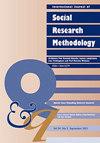不断变化的社会和临床背景下研究和评估方法的伦理、严谨性和敏捷性:一个社会心理研究中心对COVID-19大流行影响的思考
IF 3
3区 社会学
Q1 SOCIAL SCIENCES, INTERDISCIPLINARY
International Journal of Social Research Methodology
Pub Date : 2023-02-26
DOI:10.1080/13645579.2023.2173428
引用次数: 0
摘要
癌症社会心理研究中心开展世界领先的研究和服务评估,以支持癌症患者的福祉和生活质量。本文反映了我们在COVID-19大流行期间如何调整我们的研究管理和研究方法,以及对正在进行的研究实践的影响。我们使用四个案例研究来考虑采用远程方法进行研究和评估交付的好处和挑战:在远程批准的评估项目中保持高道德标准和数据安全;招募和运行在线讨论组,为干预措施的发展提供信息;通过视频会议设计和提供面对面的干预;并采用纵向定性研究来关注新出现的问题。我们思考如何在进行远程研究和评估时保持质量和严谨性,以及这将如何影响我们作为研究人员的经验。我们还考虑了COVID-19大流行造成的不确定性对未来研究和评估的资助和设计可能产生的影响。本文章由计算机程序翻译,如有差异,请以英文原文为准。
Ethics, rigour and agility of research and evaluation methods in a changing social and clinical context: Reflections from a psychosocial research centre on the implications of the COVID-19 pandemic
ABSTRACT The Centre for Psychosocial Research in Cancer conducts world-leading research and service evaluations to support well-being and quality of life amongst those affected by cancer. This paper reflects on how we adapted our research management and study methods during the COVID-19 pandemic, and the implications for ongoing research practice. We use four case studies to consider the benefits and challenges of adapting to remote approaches to research and evaluation delivery: maintaining high ethical standards and data security in evaluation projects with remote approvals; recruiting for and running online discussion groups to inform intervention development; designing and delivering an in-person intervention via video conferencing; and adapting a longitudinal qualitative study to focus on newly emerging issues. We reflect on how we can maintain quality and rigour when conducting remote research and evaluation, and how this can affect our experience as researchers. We also consider possible implications of the uncertainty created by the COVID-19 pandemic for the funding and design of future research and evaluations.
求助全文
通过发布文献求助,成功后即可免费获取论文全文。
去求助
来源期刊

International Journal of Social Research Methodology
SOCIAL SCIENCES, INTERDISCIPLINARY-
CiteScore
7.90
自引率
3.00%
发文量
52
 求助内容:
求助内容: 应助结果提醒方式:
应助结果提醒方式:


